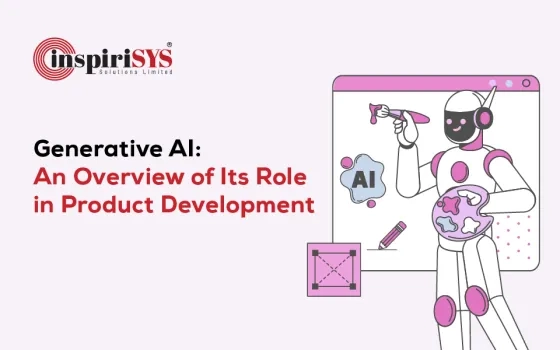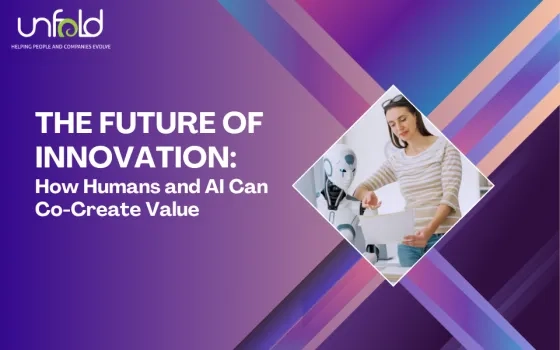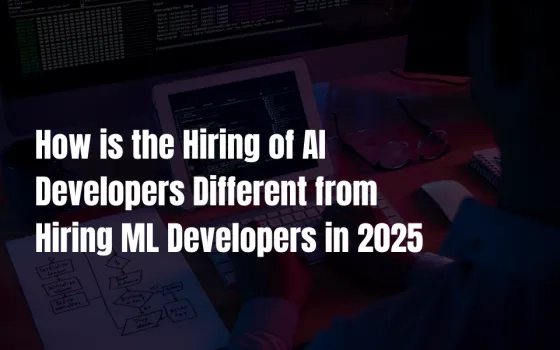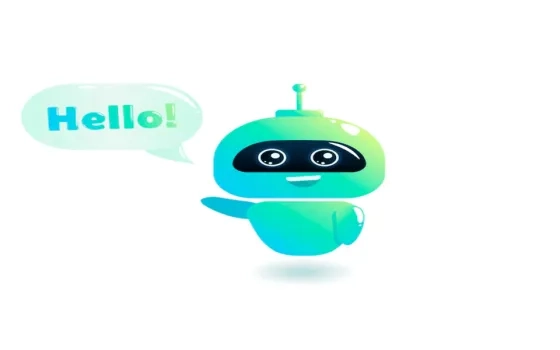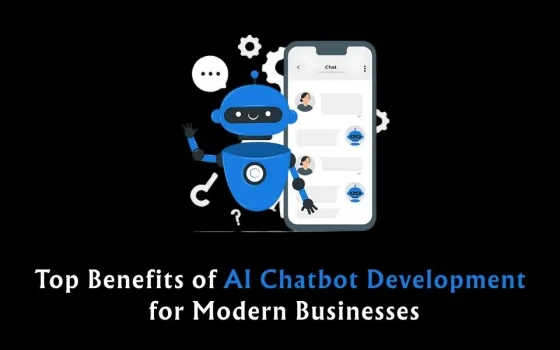Have you ever wondered how AI can transform industries within just a few years?
In a world of rapid technological advancement, Artificial Intelligence (AI) has emerged as an important innovation, transforming industries and reshaping the way businesses operate. One area where AI is making a significant impact is product development, where the integration of generative AI is creating innovative solutions that meet the evolving needs of the customers.
It streamlines product development by leveraging advanced technologies to simplify tasks and unleash creative potential. AI can analyze datasets beyond human capability, uncovering insights and patterns that often go unnoticed. This enables companies to better understand and address customer preferences and needs.
Furthermore, generative AI enhances customization by analyzing customer data to create tailored designs. However, human insight ensures these designs deeply connect with customers, developing loyalty and understanding their needs. The future of product development lies in a synergy of human intervention and AI's potential. As AI technology continues to evolve, it promises to innovate products, streamline processes, and personalize experiences for consumers worldwide.
Did you know? The market size of generative AI in product development was valued at USD 71.9 million in 2023, projected to reach USD 1,593.1 million by 2033, with a CAGR of 37.4% from 2024 to 2033.

How is AI Transforming Product Development?
AI is revolutionizing product development by enhancing efficiency and improving customer experiences, leading the way for product managers. It facilitates data-driven insights, accelerates innovation and supports informed decision-making.
1. Data Analysis
Traditionally, product managers spend considerable time gathering and analyzing company data. AI tools simplify this task, ensuring data accuracy and uncovering market trends efficiently.
2. Effective User Personas
Understanding customer needs is crucial in effective product development. AI aids in creating detailed user personas, helping teams better comprehend and address customer issues and preferences. This initiates a creative process that enhances the team's understanding of the ideal customer.
3. Boosts Creativity
AI is extensively used by product development teams to generate ideas, designs and project plans. It facilitates collaborative sessions among team members, promoting creativity and innovation.
4. Product Showcase
Generative AI empowers developers beyond content creation by acting as a creative partner. It generates visuals and materials that effectively showcase a product's features and benefits to end-users. This streamlines the development process, enabling teams to focus on product improvement.
5. Streamlining Prioritization
While planning is critical, AI provides additional support by addressing routine inquiries. It assists managers in prioritizing tasks and optimizing roadmap utilization without replacing human decision-making.
The Role of Generative AI in Product Development
Generative AI is shaping the product development across industries and is opening new era of innovation. Here are some examples of how Generative AI is making a significant impact in product development:
1. Supply Chain
The supply chain is vital in this fast-paced world. Industries like FedEx and Amazon leverage generative AI as a powerful tool. This technology is transforming the industries by:
- Predicting the data and market trends with accuracy
- Streamlining tedious tasks to ensure optimal allocations across the supply chain network
Generative AI leads to less wastage, faster delivery times and lower expenses. Ultimately, this leads to a significant advantage in today’s market. Automation, enhanced security and sustainable practices are transforming the supply chain landscape. By integrating these technologies, businesses can meet the ever-increasing market demands.
2. Aerospace Design
The field of aerospace is witnessing heights with generative AI. Companies such as Airbus and Boeing use generative AI to develop more efficient aircraft designs. This technology generates diverse design options, improving fuel efficiency and structural integrity.
3. Fashion Industry
Fashion is all about staying ahead of trends, and generative AI serves as a secret weapon. AI algorithms are revolutionizing product design by analyzing current trends, customer preferences, market demands, and customers' past purchases. This enables brands to create unique styles without compromising on customer expectations.
4. Electronics
Companies like Sony and LG are leading in the consumer electronics sector by utilising generative AI. The adoption of AI has enhanced reliability, usability, customer satisfaction, while also improving product design. This fuels innovation and sets them apart from the marketplace.
5. Manufacturing
Generative AI is reshaping the era of manufacturing and transforming how products are designed and produced. Generative AI helps create better materials that were previously considered expensive to use, leading to more efficient, cost-effective and innovative products.
The development in AI is reshaping the businesses seeking to modernise their product development processes. Specialists create customized generative AI solutions tailored to address each company's specific needs. This adds numerous benefits like innovative solutions, cost reduction, enhanced efficiency and analysing market trends.
Generative AI in Product Design Best Practices
By utilising advanced algorithms, Generative AI enables designers to explore designs based on specified parameters. This cutting-edge technology enhances creativity by generating effective solutions that align with customer needs and market trends.

1. Select a Use Case
When integrating artificial intelligence, the initial step is to define the business use case. Setting clear goals and developing a strategy for AI utilization transforms Generative AI into a powerful tool for enhancing overall productivity.
2. Data Privacy
Data privacy remains paramount and generative AI offers immense potential. Develop a plan that can uphold all privacy regulations to address privacy challenges effectively.
3. Test and Gain Insights
As generative AI evolves rapidly, its reliability across product design processes can be challenging. Therefore, conducting thorough testing is crucial to validate its effectiveness. This process also allows your team to familiarize themselves with various AI applications while assessing how effectively generative AI performs in specific use cases.
4. Equip Your Team
To ensure seamless integration, it's crucial to equip your team with the knowledge to adopt this transformative technology. Here are some of the steps to prepare the teams:
- Encourage continuous testing and gather feedback from employees
- Provide comprehensive training
- Communicate the benefits of AI workflow
Additionally, offer extensive training on AI technologies, key terminology, use cases and best practices.
5. High-Quality Data
When training the generative AI model, ensure to use only high-quality data. Avoid including any poor-quality data to ensure accurate outcomes. For optimal results, the model must be trained on accurate and reliable data. Therefore, careful selection of data is necessary.
Generative AI and Its Impact on Reducing Time to Market for New Products
Imagine a world where product development progresses rapidly and costs drop significantly. Generative AI is making this a reality, bringing a new era of innovation and efficiency. Generally, product development undergoes challenges that require solutions and involve proper planning. However, with generative AI, developers can detect and resolve these challenges early on.
Generative AI development companies explore multiple design angles and identify the issues at early stage. Additionally, since AI can anticipate customer feedback and estimate costs early in the process, products can reach the market faster at a lower cost than expected.
In essence, generative AI is transforming product development by optimizing processes, enhancing insight and driving innovation and market significance.
What is the Future of Generative AI in Product Development?
The technology landscape is evolving rapidly, and AI is streamlining processes and automating tasks. In product design, the implementation of generative AI is reaching new heights. One exciting area of development is the integration of real-time user feedback into the design process, enabling the creation of dynamic and reliable product designs.
Additionally, utilizing generative AI for design optimization is gaining attention. This approach enhances processes such as supply chain management, materials selection and manufacturing procedures. Generative AI allows deep analysis of customer preferences, leading to products that connect with your target audience.
Final Thoughts
The emergence of AI technology has revolutionized multiple industries and product development is no longer an exception. Generative AI is used to transform the process from product design to development. Further, by utilizing its analytics and content generation capabilities, this technology can unlock levels of innovation and creativity, driving meaningful change throughout the entire production lifecycle.
Ultimately, by combining the strengths of generative AI and human innovation, companies can create transformative products that enhances the performance and quality of the product.



